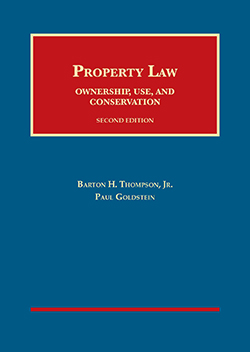- Home
- Property Law: Ownership, Use, and Conservation
Property Law: Ownership, Use, and Conservation
This title is a part of our CasebookPlus™ offering as ISBN 9781642424829. Learn more at
Faculty-CasebookPlus.com.
This casebook is designed for the property professor who wants to cover not only all the traditional property issues but also emerging environmental issues in the management of land and other resources. The casebook provides in-depth coverage of real property law, including the rights of property owners, real estate transactions and finance, estates in land, land-use regulation, and takings law. But the casebook also covers related environmental issues, reflecting the reality that issues such as wetland protection, conservation easements, and water scarcity are today as important, if not in some cases more important, to many property lawyers as more traditional concerns such as the rule against perpetuities, subjacent land support, and deed construction. Looking at property law through an environmental lens also provides new insights and new ways of conceptualizing property doctrines. The result is a readable, interesting, and cutting-edge treatment of modern property law. This new edition has been thoroughly updated. This edition provides brand new coverage of emerging issues, such as judicial takings, takings legislation, the subprime mortgage crisis, same-sex relationships, fracking, legal protection of ecosystem services, and public access to beaches (one of the hottest topics today in the collision of private and public interests in land).
Imprint: Foundation Press
Series: University Casebook Series
Publication Date: 12/26/2013
Barton H. Thompson Jr., Stanford Law School
Paul Goldstein, Stanford Law School
CasebookPlus™
This title is available in our CasebookPlus format. CasebookPlus provides support beyond your classroom lectures and materials by offering additional digital resources to you and your students. Anchored by faculty-authored formative self-assessments keyed to our most popular casebooks, CasebookPlus allows students to test their understanding of core concepts as they are learning them in class – on their own, outside of the classroom, with no extra work on your part. CasebookPlus combines three important elements:
- A new print or digital casebook
- Access to a downloadable eBook with the ability to highlight and add notes
- 12-month access to a digital Learning Library complete with:
- Chapter questions keyed to the casebook
- Black Letter Law questions (available in select subjects)
- Subject area review questions for end of semester use
Leading digital study aids, an outline starter, and audio lectures in select subjects
Students can still utilize CasebookPlus digital resources if they’ve purchased a used book or are renting their text by purchasing the Learning Library at westacademic.com.
With CasebookPlus, you can customize your students’ learning experience and monitor their performance. The quiz editor allows you to create your own custom quiz set, suppress specific quiz questions or quiz sets, and time-release quiz questions. Additionally, the flexible, customized reporting capability helps you evaluate your students’ understanding of the material and can also help your school demonstrate compliance with the new ABA Assessment and Learning Outcomes standards.
This new edition has been thoroughly updated. The casebook provides brand new coverage of emerging issues, such as judicial takings, takings legislation, the subprime mortgage crisis, same-sex relationships, fracking, legal protection of ecosystem services, and public access to beaches (one of the hottest topics today in the collision of private and public interests in land). The casebook also includes expanded treatment of cutting-edge subjects such as common communities, intellectual property, exactions, and conservation easements. Finally, the authors have added a number of new cases on traditional doctrines, highlighting for students the contemporary importance of property law.
Learn more about this series.
Access Denied
Law School Faculty - Sign in or Create an Account to access this content. Law faculty who have created an account can sign in after receiving email notification that registration has been approved. Email accountmanager@westacademic.com or call 800-313-9378 for assistance.
Other Higher Education Faculty who wish to access digital review copies or teaching resources should contact their West Academic Account Manager at college@westacademic.com or 800-360-9378.
Adopters Only
This content is intended for adopters only. Sign in or Create an Account to access this content. Law faculty who have created an account can sign in after receiving email notification that registration has been approved. If you are an adopter who is unable to access this content after signing in, contact your account manager for assistance at accountmanager@westacademic.com or call 800-313-9378 for assistance.
Access Denied
Sign in or Create an Account to access this content. Faculty who have created an account can sign in after receiving email notification that registration has been approved. Contact us for assistance.
Law School Faculty: email accountmanager@westacademic.com or call 800-313-9378.
Other Higher Education Faculty: email college@westacademic.com or 800-360-9378.
Access Denied
Higher education faculty who wish to view this document should contact their West Academic Account Manager at college@westacademic.com or 800-360-9378.

